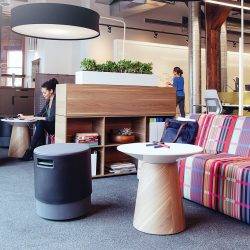To provide the best experiences, we use technologies like cookies to store and/or access device information. Consenting to these technologies will allow us to process data such as browsing behaviour or unique IDs on this site. Not consenting or withdrawing consent, may adversely affect certain features and functions.
The technical storage or access is strictly necessary for the legitimate purpose of enabling the use of a specific service explicitly requested by the subscriber or user, or for the sole purpose of carrying out the transmission of a communication over an electronic communications network.
The technical storage or access is necessary for the legitimate purpose of storing preferences that are not requested by the subscriber or user.
The technical storage or access that is used exclusively for statistical purposes.
The technical storage or access that is used exclusively for anonymous statistical purposes. Without a subpoena, voluntary compliance on the part of your Internet Service Provider, or additional records from a third party, information stored or retrieved for this purpose alone cannot usually be used to identify you.
The technical storage or access is required to create user profiles to send advertising, or to track the user on a website or across several websites for similar marketing purposes.
 The UK Green Building Council (UKGBC) has launched new guidance on Scope 3 embodied carbon measurement and reporting, for stakeholders across the built environment. Scope 3 represents a proportion of an organisation’s indirect embodied carbon emissions that can constitute up to 80-95 percent of its total value chain footprint. Setting out a way to coherently align embodied carbon assessments, the guidance reframes Scope 3 reporting as a singular methodology rather than siloed efforts. (more…)
The UK Green Building Council (UKGBC) has launched new guidance on Scope 3 embodied carbon measurement and reporting, for stakeholders across the built environment. Scope 3 represents a proportion of an organisation’s indirect embodied carbon emissions that can constitute up to 80-95 percent of its total value chain footprint. Setting out a way to coherently align embodied carbon assessments, the guidance reframes Scope 3 reporting as a singular methodology rather than siloed efforts. (more…)




















 Any business that is looking to grow its consumer base or expand into new markets is likely to be relying on digital technology to a greater extent than ever before both in their operations and management. This also means that the
Any business that is looking to grow its consumer base or expand into new markets is likely to be relying on digital technology to a greater extent than ever before both in their operations and management. This also means that the 











March 20, 2024
Reviving flexible workspaces – a guide to saving failing operations
by Calum Russell • Comment, Property